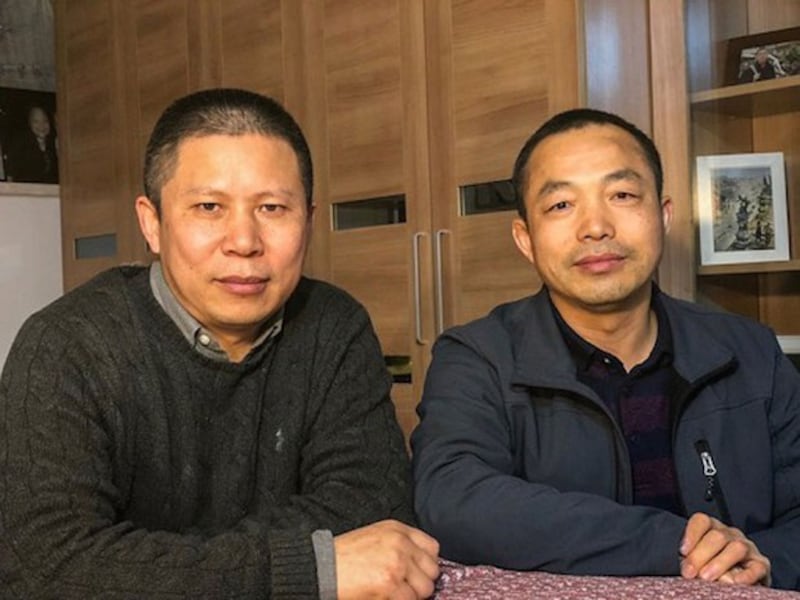Prominent Chinese dissident Xu Zhiyong is being held separately from fellow prisoners under a number rather than his name, and subjected to round-the-clock monitoring by his cell-mates, according to U.S.-based legal scholar Teng Biao.
Xu, who was nominated for a Nobel Peace Prize in February, is also being forced into labor at the unnamed prison where he is currently serving a 14-year jail term for " subversion of state power," Teng said.
His trial alongside rights lawyer Ding Jiaxi was widely criticized by rights activists as resulting from a trumped-up charge. Activists and rights lawyers say Xu has never advocated violence, and has paid a very heavy price for advocating for his personal ideals.
Normally, inmates are held in cells with about 12 beds. But Xu is being held in a four-bed cell separately from the other prisoners, Teng said, citing information that emerged during a visit by Xu's family members on June 25.
"I recently received news that Dr. Xu Zhiyong's basic rights are being violated and abused in prison," Teng said. "The worst of it is that Xu Zhiyong has moved to a cell with just three cell-mates, who are responsible for guarding him constantly and monitoring him continuously round the clock."
Related stories
[ Tortured dissident Xu Zhiyong stands trial for ‘subversion’Opens in new window ]
[ China sentences 2 prominent activists after attending 2019 dissident gatheringOpens in new window ]
[ US lawmakers nominate Uyghur professor, Chinese dissident for Nobel Peace PrizeOpens in new window ]
"Xu Zhiyong has also been deprived of his name during forced labor, and is referred to by a code name, 003," Teng told RFA Mandarin.
The cell-mates are acting as proxies for prison guards, preventing him from talking to anyone, and Xu has to be escorted to the bathroom by one of them, Teng said.
Xu is also being deprived of phone calls and reading and writing materials, and his family say they've never received any of the letters he writes to them, Teng said, adding that Xu is allowed to read only prison-approved books on Chinese culture.
Detained after Xiamen dinner
Xu, who has already served jail time for launching the New Citizens' Movement for greater official accountability, was detained in early 2020 and held on suspicion of "subversion of state power" alongside Ding and other activists who held a dinner gathering in the southeastern port city of Xiamen on Dec. 13, 2019.

Rights groups say the case against him has been marred by rights violations. Both men were held incommunicado, denied permission to meet with either family members or a lawyer for two years.
On April 10, 2023, the Linshu County People's Court in the eastern province of Shandong handed down a 14-year jail term to Xu Zhiyong and a 12-year sentence to Ding.
Police continue to put pressure on Xu's family members, Teng said.
"The family members who visit have been harassed, threatened and intimidated by state security police," Teng said.
On May 4, state security police from Henan province followed Xu's sister to ensure she has had no contact with the outside world, as required by the authorities, he said.
"It's very common for the Chinese Communist Party to abuse political prisoners and prisoners of conscience," Teng said. "They particularly target prisoners of conscience like Xu Zhiyong who have had some impact at home and overseas."
Called for Xi to quit
Teng said one of the reasons for the harsh treatment was Xu's letter calling on Chinese Communist Party leader Xi Jinping to step down, which is believed to be the trigger for his 2020 arrest.
He called on Western governments to put diplomatic pressure on Beijing over the authorities' treatment of Xu.
"If this kind of abuse continues, it will do great harm to Dr. Xu Zhiyong's physical and mental health," Teng said.

Swedish political commentator Zhang Yu, who campaigns for jailed writers for Independent Chinese PEN, said Xu's treatment is even harsher than that meted out to late 2010 Nobel peace laureate Liu Xiaobo.
"I didn't expect them to go this far," Zhang said. "This is much worse than the way Liu Xiaobo was treated."
Zhang called on the international community to call for the release of Chinese prisoners of conscience like Xu, and for him to receive humane treatment in line with international human rights standards.
Translated by Luisetta Mudie. Edited by Malcolm Foster.
